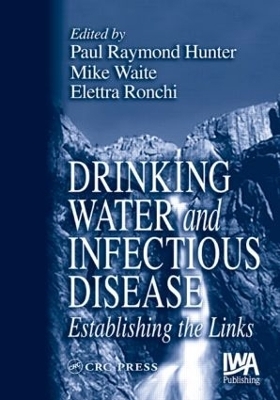
Drinking Water and Infectious Disease
Establishing the Links
Seiten
2002
Crc Press Inc (Verlag)
978-0-8493-1259-5 (ISBN)
Crc Press Inc (Verlag)
978-0-8493-1259-5 (ISBN)
- Titel ist leider vergriffen;
keine Neuauflage - Artikel merken
Focuses on the question of how the link between drinking water and infectious disease can be demonstrated and proven. This work gathers information from an international team of experts to provide an overview of current best practices and direction for assessing the safety of drinking water and responding to adverse events.
In many countries, considerable uncertainty still exists about the contribution of drinking water to sporadic cases of disease. The Organization for Economic Cooperation and Development (OECD), in cooperation with the World Health Organization (WHO), led the Workshop on Molecular Technologies for Safe Drinking Water in 1998 to address the role of water in the transmission of infectious disease. One of the results was a call for improved surveillance and outbreak investigation. Drinking Water and Infectious Disease: Establishing the Links, derived from an OECD workshop hosted by the UK government in Basingstoke, addresses that crucial recommendation.
Unlike books that give a broad view on the public health issues regarding water and health, this book focuses on the tools available to identify the links between drinking water and infectious disease and how they might be used. It gathers state-of-the-art information from an international team of experts, including most of the world's leading authorities on waterborne disease epidemiology and investigation, to provide an overview of current best practices and direction for assessing the safety of drinking water and responding to adverse events.
Organized into three sections, this user-friendly text is the only book to put forward clear guidance on the surveillance for and investigation of waterborne infectious disease at the local, national, and international levels. Based on an OECD international meeting, each section is introduced by the relevant session chairs, and includes research approaches using models and innovative field experiences to provide a wide selection of ideas for others to field test or modify. Researchers will be able to use this information not only to study the epidemiology of infectious diseases, but also to investigate and prevent waterborne diseases. Drinking Water and Infectious Disease is a landmark text in both the field of waterborne disease and more generally in infectious disease epidemiology.
In many countries, considerable uncertainty still exists about the contribution of drinking water to sporadic cases of disease. The Organization for Economic Cooperation and Development (OECD), in cooperation with the World Health Organization (WHO), led the Workshop on Molecular Technologies for Safe Drinking Water in 1998 to address the role of water in the transmission of infectious disease. One of the results was a call for improved surveillance and outbreak investigation. Drinking Water and Infectious Disease: Establishing the Links, derived from an OECD workshop hosted by the UK government in Basingstoke, addresses that crucial recommendation.
Unlike books that give a broad view on the public health issues regarding water and health, this book focuses on the tools available to identify the links between drinking water and infectious disease and how they might be used. It gathers state-of-the-art information from an international team of experts, including most of the world's leading authorities on waterborne disease epidemiology and investigation, to provide an overview of current best practices and direction for assessing the safety of drinking water and responding to adverse events.
Organized into three sections, this user-friendly text is the only book to put forward clear guidance on the surveillance for and investigation of waterborne infectious disease at the local, national, and international levels. Based on an OECD international meeting, each section is introduced by the relevant session chairs, and includes research approaches using models and innovative field experiences to provide a wide selection of ideas for others to field test or modify. Researchers will be able to use this information not only to study the epidemiology of infectious diseases, but also to investigate and prevent waterborne diseases. Drinking Water and Infectious Disease is a landmark text in both the field of waterborne disease and more generally in infectious disease epidemiology.
Paul Raymond Hunter, Michael Waite, Elettra Ronchi
Surveillance of Waterborne Disease. Investigation of Outbreaks of Waterborne Disease. Investigation of Sporadic Waterborne Disease.
| Erscheint lt. Verlag | 30.7.2002 |
|---|---|
| Co-Autor | Gunther F. Craun, Alfred Dufour, Denis Zmirou |
| Zusatzinfo | 25 Tables, black and white; 1 Halftones, black and white; 50 Illustrations, black and white |
| Verlagsort | Bosa Roca |
| Sprache | englisch |
| Maße | 178 x 254 mm |
| Gewicht | 670 g |
| Themenwelt | Studium ► Querschnittsbereiche ► Infektiologie / Immunologie |
| ISBN-10 | 0-8493-1259-0 / 0849312590 |
| ISBN-13 | 978-0-8493-1259-5 / 9780849312595 |
| Zustand | Neuware |
| Haben Sie eine Frage zum Produkt? |
Mehr entdecken
aus dem Bereich
aus dem Bereich
Antibiotika, Virostatika, Antimykotika, Antiparasitäre Wirkstoffe
Buch | Hardcover (2024)
Thieme (Verlag)
CHF 179,90


